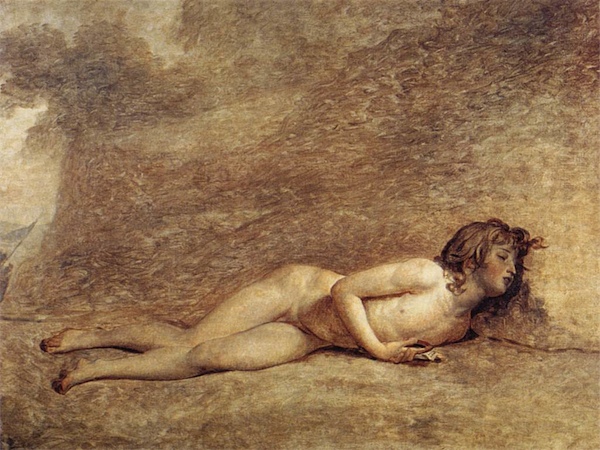
Die Revolution muß aufhören, und die Republik muß anfangen. – In unsern Staatsgrundsätzen muß das Recht an die Stelle der Pflicht, das Wohlbefinden an die der Tugend und die Notwehr an die der Strafe treten. Jeder muß sich geltend machen und seine Natur durchsetzen können. Er mag nun vernünftig oder unvernünftig, gebildet oder ungebildet, gut oder böse sein, das geht den Staat nichts an. Wir alle sind Narren, es hat keiner das Recht, einem andern seine eigentümliche Narrheit aufzudrängen. – Jeder muß in seiner Art genießen können, jedoch so, daß keiner auf Unkosten eines andern genießen oder ihn in seinem eigentümlichen Genuß stören darf.
The revolution must cease and the republic must begin. – In the principles of our state rights must take the place of duties, happiness that of virtue and self-defense must take the place of punishment. He might be reasonable or unreasonable, educated or uneducated, good or evil, that is a matter of indifference to the state. We are all fools, none of us has the right to force his particular foolishness upon the others. – Each of us must in his own way be able to live, however, in a way in which no one lives at the expense of another or is able to deprive him of his own particular way of life.
—Georg Büchner, Dantons Tod, act i, sc i (1835)(Hérault)(S.H. transl.)
Georg Büchner, a young doctor with revolutionary sentiments who made a brilliant appearance on the literary scene before his premature death, is often viewed as a sort of proto-Marxist. His writings are filled with premonitions of class warfare. On occasion his characters spout atheist sentiments and denounce religion as a tool for class repression. Much of his work seems to build on ideas of historical materialism. There’s no denying that these traces are present in his writing. However, there is also evidence of a rather more conservative Büchner. In fact not a few of the revolutionaries of the first half of the nineteenth century in Germany emerged as something more akin to conservative nationalists as the century wore towards its conclusion.
But this passage, one of the more intriguing speeches in his fiery political play, The Death of Danton, offers some real insights. The words are placed in the mouth of Hérault-Séchelles, who would at first glance appear to be a fairly minor figure both in French politics of the era and in Büchner’s play. But studied a bit more patiently, Hérault really is a key figure who plays a particularly noble role in a tragic play–a role which curiously transcends politics. Here in the early pages of the play, Hérault is positioned as the philosophical counterpoint to Robespierre and his philosophy of terror, and the lines he utters serve that purpose more strikingly than any of Danton’s. But when we stop and ponder his words, they don’t sound particularly French. Hérault’s republic looks distinctly like the one being born across the Atlantic in America. It focuses on individual liberty and it is hostile to the idea of an expansive state. “We are all fools,” he says, but “none of us has the right to force his particular foolishness upon the others.”
As he is composing this play, Büchner is also comparing the French Revolution with the American in terms distinctly to the advantage of the later. “In a just republic,” he says, “things must proceed as they have in America, and each must have a right to one vote without regard to his particular wealth.” But he is equally dismissive of idealists who avoid recognition of the eternal struggle for property. Büchner hopes to motivate the masses to rise in revolt; he despairs of the prospects for a revolution anchored only in the modest numbers of liberals and intellectuals. He argues that the promise of a new state must encompass the right of private property and freedom from the oppressive taxation of the petty German states–and when he alludes to capitalists, it is to a class which should naturally want to support his revolution. Büchner is a revolutionary, surely. But a proto-Marxist? That’s far from likely.
Every revolution needs its heros. That was Maximilien Robespierre’s thought when he rose to praise a young soldier named Joseph Barra in a speech in the Assembly in 1793. Barra, engaged in an action against counterrevolutionaries in the Vendée, had been encircled and told to cry “vive le roi!” to save himself, but instead answered with “vive la république!” and was killed. Modern historians sharply discount this as myth making. But Robespierre knew how to go about myth making in a grand way. He commissioned David to paint a memorial to this young martyr to the republic.
Listen to Ludwig van Beethoven’s salute to the French Revolution, the Symphony No. 3 in E Flat Major, “Eroica,” here in a performance by the Berlin Philharmonic under the leadership of Herbert von Karajan.



